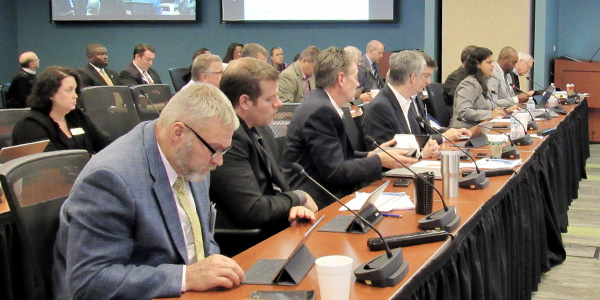By Amanda Durish Cook
CARMEL, Ind. — MISO’s Board of Directors voted unanimously last week to approve the $3.3 billion, 442-project 2018 Transmission Expansion Plan in its entirety despite stakeholder objections to three projects.
Last month, the Planning Advisory Committee withheld endorsement of two MTEP 18 projects: the rebuild of the Wabaco-Rochester 161-kV line in southern Minnesota, and American Transmission Co.’s proposal to replace a 138-kV circuit connecting Michigan’s Upper and Lower peninsulas in the Straits of Mackinac. (See MTEP 18 Advancing with 2 Contentious Projects.)
At the board’s System Planning Committee meeting on Dec. 4, and again at the Dec. 6 board meeting, Xcel Energy’s Carolyn Wetterlin insisted that the Wabaco-Rochester area is “not ripe for a project yet,” asking directors to delay the project for a year so planners can find a better solution to ease congestion in the area. Dairyland Power Cooperative representatives also reiterated their concern that the co-op’s customers would have to pay for an unnecessary line, complaining that MISO staff and board were ignoring stakeholder voices.
Meanwhile, Consumers Energy challenged a third project, a $21 million, 138-kV interconnection near the Michigan-Ohio border.
Consumers’ Donald Lynd said Michigan Electric Transmission Co.’s (METC’s) Morenci line is a distribution line under the seven-factor test of FERC Order 888 because the line would be radial in nature.
“If MISO approves the project, Consumers Energy does intend to seek a determination from FERC,” Lynd announced during a public comment period.
The RTO responded that it had no authority to address Consumers’ request.
“MISO legal staff has reviewed this objection and has determined that under the terms of the Transmission Owners Agreement, asset classification is a matter to be determined between the transmission owner (METC) and FERC,” it said.
“Clearly, we’re at an impasse for at least a few of the projects,” Director Mark Johnson acknowledged before the SPC approved the full MTEP 18.
But he noted that the committee ensured that RTO leadership responded to the stakeholders and followed the MTEP procedure as outlined in the Tariff and Business Practices Manuals.
“I don’t think we should ever have grand illusions that we will have 100% consensus with the size and scope of the projects in Appendix A,” Johnson said.
Director Phyllis Currie said stakeholders should not view the board’s approval of the projects as brushing aside member concerns. “We acknowledge there’s going to be times when there’s disagreement,” she said.







